📖 Article Content 📖
Have you ever typed out a word, only to realize later that something just didn't look quite right, like perhaps you were spelling eagles wrong? It happens to everyone, you know, a little slip of the finger or a momentary blank when trying to recall how a particular collection of letters should appear. Getting words down accurately on paper or on a screen can feel like a tricky business, especially when certain sounds could be put together in several different ways. It’s almost as if some words just wait to trip us up, isn't that so?
For many, getting a good handle on words, making sure they are put together correctly, is a really important skill. It helps us get our ideas across clearly, whether we're writing a quick note or putting together something much longer. When words are put together well, people tend to understand what you're trying to say without any confusion, which is pretty essential for good communication, actually.
Thankfully, there are ways to make this whole process a bit easier and, dare I say, even fun. Tools exist that help people, young and old, get better at word practice. These resources aim to build up a person's word bank and their ability to put letters in the right order, making the journey to becoming a word whiz much more enjoyable and less like a chore, you know?
- Dti Hear Me Out
- Is Shawn Dead From Fgteev
- Meek Mill With Dreads
- Buck Teeth Duck
- How Tall Is Sockie Norris
Table of Contents
- How Can We Get Better at Word Practice?
- Getting a Grip on Phonics and Sounds
- Why Do Online Activities Help with Spelling Eagles Wrong?
- More Than Just Putting Letters Together
- The History of a Helpful Tool
- How Does Immediate Feedback Change Learning?
- Supporting Learning at Home and School
- Is Having Fun Really Part of Learning to Avoid Spelling Eagles Wrong?
How Can We Get Better at Word Practice?
When it comes to getting a better handle on new words and making them stick in your mind, practicing how they are put together is, you know, a really good way to go about it. Some tools, like the one we're talking about, give you a chance to work on your word collection and how you write them out. It's almost like building a personal library of words, one correct letter arrangement at a time, which is pretty neat. These sorts of activities help people get more comfortable with words they might not see every day, helping them feel more confident when they read or write, which is rather important.
The main idea here is to make the act of working with words something you actually want to do. If it feels like a chore, you're less likely to stick with it. So, a good way to approach this is through activities that are, well, a bit more lively. Think about ways that make you want to keep going, where you don't even realize you're getting better because you're enjoying the process. This kind of approach can make a big difference in how quickly someone picks up new word skills and keeps them for the long run, apparently.
Getting a Grip on Phonics and Sounds
Learning how letters sound and how those sounds fit together is a big part of getting good at words. There are, you know, certain sound-based activities for younger learners that really help them become quite skilled at putting words together. These activities focus on the sounds individual letters make, or how groups of letters sound when they're next to each other. It's like breaking down the word into its smallest sound pieces, which helps a person hear what they need to write down. This can make a huge difference when they are trying to figure out how to put together a word they’ve only heard before, so it's a very practical skill.
- Hidden Happy Ending
- Your Big Forehand
- How To Cut A 9x13 Cake Into 24 Pieces
- Lcs Pallets Liquidation
- Rob Dillingham Brother
By working on these sound skills, children start to see the connections between what they hear and what they write. It’s a bit like learning the building blocks of language. Once they understand how sounds relate to letters, they can start to guess at how new words might be spelled, or at least have a better starting point. This kind of practice really sets them up for success, giving them a solid base for all their future word adventures. It’s a fundamental step, really, for anyone learning to read and write clearly.
Why Do Online Activities Help with Spelling Eagles Wrong?
When it comes to getting better at words, especially avoiding those tricky mix-ups like spelling eagles wrong, online activities can be a real help. They offer a way for people to improve their ability to put words together and expand their word collections through engaging, interactive play. Imagine having access to lots of different ways to practice, all from your computer or tablet. It means you can try out different approaches until you find what clicks for you, which is pretty convenient, actually.
These kinds of online settings can also make the whole process feel less like schoolwork and more like, well, just playing around. When you're having a good time, you tend to absorb things without even thinking about it. So, if you're working on how to write out a particular word, and you're doing it in a fun activity, you're more likely to remember it correctly the next time. It’s a pretty effective way to learn, if you ask me, because it taps into that natural human desire for fun.
More Than Just Putting Letters Together
Some of these online resources offer a wide variety of ways to practice, often with more than 40 different activities to choose from. This means you're not just doing the same thing over and over again, which can get a bit dull, you know? Instead, you get to explore many different kinds of interactive word activities for people of all ages. One day you might be working on definitions, the next you could be sorting words by their sounds, so it’s always fresh. This variety helps keep things interesting and makes sure you're getting practice from many different angles, which is really important for a full grasp of words.
These activities often go beyond just putting letters in order. They might ask you to think about what a word means, how it sounds, or even how it fits into a sentence. For instance, some activities give you the chance to name a letter to put together a word you're working on. Another might show you a word's meaning or a sentence with a missing word, asking you to fill in the blank. This kind of broad approach helps people not just put letters in order, but truly get a feel for the word itself, which is a bit more complete, isn't it?
The History of a Helpful Tool
It's interesting to look at how some of these helpful tools came to be. One particular online utility, which was initially just for word practice, took off very quickly. It was so popular that it had millions of people using it in its first school year. That's a lot of people finding something useful right away, so it clearly met a need. It started out as a straightforward way to get better at putting words together, and people really took to it, which is rather telling.
Then, over time, this tool grew and added more features. In early 2011, it expanded its focus. It changed its name to include a wider range of language skills, showing that it was now about more than just putting letters in order. This kind of growth means that the creators were listening to what people needed and wanted, making the tool even more comprehensive for those trying to get a better handle on words. It’s a pretty good example of how something simple can become something much bigger and more helpful.
How Does Immediate Feedback Change Learning?
One of the really helpful things about some of these online tools is the chance to check your own work right away. For instance, a feature called "SpeedySpeller" lets you listen to each word spoken aloud and then type out the correct arrangement of letters as fast as you can. After you type it, you get to see if you got it right then and there. This kind of quick response is, you know, very good for learning because you don't have to wait to find out if you made a mistake. You can fix it right away, which makes the learning stick better, apparently.
This immediate insight into your performance is quite different from waiting for a teacher to mark your paper. When you know right away what you did well and what you need to work on, you can adjust your approach immediately. It's like having a personal coach telling you exactly what to do next. This quick feedback loop helps to build confidence and helps you understand where you might be making those common mix-ups, so it’s a very direct way to improve.
Supporting Learning at Home and School
Teaching people how to put words together and build their word collections can be made quite simple with the right kind of online resource. Students can use these tools to go over their word lists by using various word and spelling practice activities and games. This means that learning doesn't just happen in the classroom; it can continue at home, too. It provides a consistent way for people to keep working on their language skills, making sure they don't forget what they've learned, which is pretty useful.
These kinds of resources can really help support what's happening in the classroom. When students can take their word tests online and get instant replies, it gives them a clear picture of how they're doing. The results even show the correct arrangement of letters for any wrong answers, plus offer extra activities to go over those tricky bits. It's a bit like having a personalized study guide that points you exactly where you need to focus more, which can be very helpful for busy families and teachers alike.
Is Having Fun Really Part of Learning to Avoid Spelling Eagles Wrong?
It turns out that having a good time while you're learning to avoid those common errors, like spelling eagles wrong, is actually a really big part of the process. A lot of these word practice activities are designed to be quite enjoyable and lively. They combine many different ways of learning, such as looking at letter sounds, how words are patterned, breaking words into syllables, their meanings, how they function in a sentence, and even words that mean the same or the opposite. All these aspects are woven into activities that are, you know, rather pleasant to do.
When people are enjoying themselves, they are much more likely to stick with something and absorb the information without even trying too hard. It’s a bit like playing a game where you're learning something new without realizing it. This kind of approach, where learning feels like play, is especially good for younger learners. They get to have a blast while getting better at their words, which is a pretty good deal for everyone involved, if you ask me. It just goes to show that learning doesn't always have to be a serious, quiet affair; it can be full of laughter and good times, too.



